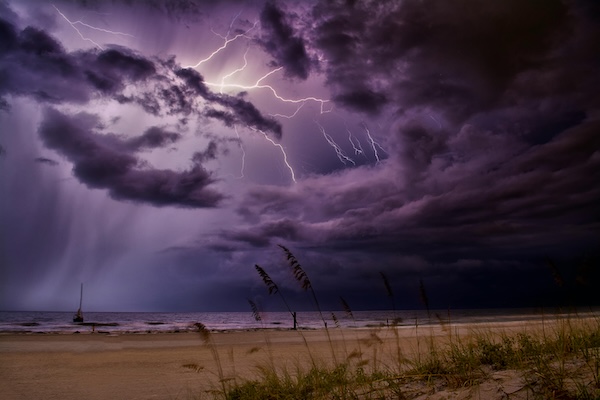Local Impacts and Extreme Event Attribution
Understand how local weather events and climate change are related. Explore this relationship between local impacts and climate change and discuss the emerging science of extreme event attribution. Try being a climate detective and investigate the scientific claims of a media report.

Created by —
Terra.do
Created by the Terra.do learning team and overseen by the Climate Fellowship editorial group and the Academic Advisory Board.
Introductory level
No prior knowledge is required, but an interest in climate science and extreme weather is desirable
Flexible schedule
Learn according to your schedule with fully asynchronous learning
Foundational
Build foundational knowledge about climate change and climate science
2 weeks / 2 hours per week
Expected commitment. We will help keep yourself accountable with timely check-ins
Course overview
Extreme weather events are becoming more frequent and severe, but how do we determine whether climate change is to blame? This course explores extreme event attribution, the science of linking specific disasters—such as hurricanes, heatwaves, and floods—to human-caused climate change. We begin with an introduction to attribution science, its limitations, and key findings from the IPCC AR6 report. Participants will also have the opportunity for deeper dives into advanced attribution studies and their real-world applications.
Beyond the science, we examine the broader impact of extreme events, including compounding and overlapping disasters, how climate change affects homes and communities, and the challenges of communicating risk. The course concludes with practical insights on using storytelling and data to convey climate impacts effectively. By the end, participants will have a solid understanding of the role of extreme event attribution in climate science, policy, and public discourse.

Skills you will learn
Understanding extreme event attribution
Learn the science behind linking specific weather events to human-caused climate change.
Interpreting climate reports
Analyze key findings from the IPCC AR6 and other attribution studies to understand climate trends.
Assessing disaster risks
Explore how compounding disasters impact communities and what climate change means for local resilience
Communicating climate impacts
Develop strategies for effectively conveying extreme weather risks through data and storytelling
Who is this course for?
Climate policy professionals
Those working in climate adaptation, risk assessment, or policymaking who need to understand extreme event attribution
Journalists & communicators
Writers and media professionals looking to report accurately on climate-driven disasters and their causes
Disaster response & resilience planners
Emergency managers and urban planners seeking to integrate climate science into disaster preparedness
Scientists & researchers
Academics and professionals interested in the latest attribution science and its role in climate impact assessments
Course syllabus
Introduction to extreme event attribution
An overview of how scientists determine whether climate change has influenced specific extreme weather events
Limits of extreme event attribution
Examines the challenges and uncertainties in attribution science, including data limitations and modeling complexities
IPCC AR6 findings on extreme weather and climate change
Reviews key insights from the latest IPCC report on how climate change is driving extreme weather trends
Optional deeper dives into extreme event attribution
Provides additional resources for those who want to explore the methodologies and case studies in greater detail
Applications of extreme event attribution
Explores how attribution science informs climate policy, legal cases, disaster planning, and public awareness
What is a disaster?
Defines disasters from a scientific and societal perspective, distinguishing between natural hazards and human vulnerability
Compounding, overlapping disasters
Investigates how multiple extreme events—such as heatwaves and wildfires—interact and amplify their impacts
What’s going to happen to my home?
Examines the localized effects of climate change, helping individuals understand future risks to their communities
Communicating weather and climate change with stories
Focuses on using storytelling and data visualization to effectively convey climate risks and extreme event attribution findings
This course is currently being updated - Join the waitlist & get 10% off when it reopens
Join the Waitlist
Enter your email and we'll keep you updated.
Meet the course creator

Terra.do
Created by the Terra.do learning team and overseen by the Climate Fellowship editorial group and the Academic Advisory Board.
Terra.do is a global climate learning and careers platform dedicated to equipping professionals with the knowledge and skills needed to drive climate action. Through expert-led courses, interactive learning experiences, and a vibrant community, Terra.do empowers individuals across industries to transition into and thrive in climate-focused roles. With a mission to get 100 million people working on climate solutions, the platform connects learners with real-world opportunities in sustainability, policy, climate finance, and beyond.
We collaborate with industry experts, practitioners, and organizations to deliver high-impact programs covering key climate topics. Whether through deep-dive fellowships, specialized courses, or our extensive climate job board, we serve as a trusted resource for professionals seeking to make a meaningful impact in the fight against climate change.
Learn the skills and find the community to work on climate
Take expert-led courses, join a global network, and work on real climate solutions.
Leveraging Data and AI in Sustainability
A four-week online course focused on scaling data use to accelerate sustainability initiatives, developing a fit-for-purpose data and AI strategy...
Soil Health and Regenerative Farming
This two-week course gets you up to speed on soil health and the critical role it plays in addressing climate...
Fundamentals of Climate Science
Learn to measure and compare the climate impacts of different greenhouse gases, clear up misconceptions about emissions, and understand what’s...
Mastering Corporate Climate Reporting
Four-week course covering climate-related financial disclosures and reporting requirements that have increasingly become mandatory in markets across the world.
Carbon Removal Technologies and Risks
A four-week online deep-dive into the carbon dioxide removal (CDR) portfolio, covering advantages, challenges, and risks of currently pursued approaches...
Carbon Accounting and Reduction
A four-week online course on the process and best practices to measure carbon footprint and establish reduction targets for businesses.
